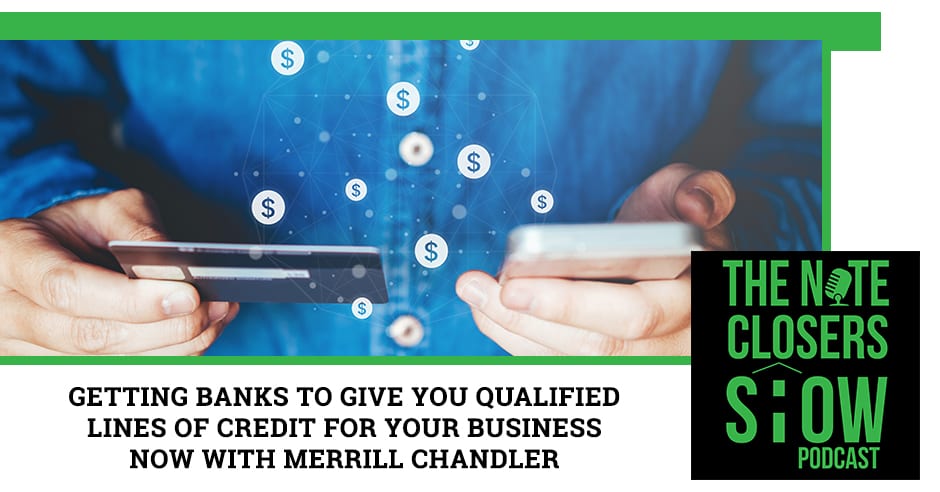
One of the great struggles among investors and entrepreneurs is getting to the good side of banks so they can be funded. It’s time to remove that barrier and get the lines of credit you need now. In this interesting discussion, Scott Carson interviews Merrill Chandler from Get Fundable about how he and his team are helping real estate investors and entrepreneurs secure business lines of credit from banks without having to build a long relationship. Sometimes, we just don’t have all the time in the world to get chummy with these institutions. Listen to Scott and Merrill in this episode to know more about how you can become more fundable, get qualified lines of credit that you can use for your deals and a whole variety of things.
—
Listen to the podcast here:
Getting Banks To Give You Qualified Lines Of Credit For Your Business Now With Merrill Chandler
I’m here with a credit messiah, our buddy, Merrill Chandler from GetFundable.com. You’ve got another alter ego that you’re launching, is that correct? Are they good? Are they bad? What’s the superhero you’ve got going and rocking right now?
I’m glad you brought that up. This last bootcamp, we keep leveling up our bootcamp and the power of the information because we get feedback from the people that go through the bootcamp. They give us feedback like, “I did this.” “What happened? This is crazy.” We get all this feedback and we keep tightening up. I don’t have the FICO algorithms. It may look like it in the results we get, but I don’t have them. When we get feedback from our bootcampers and masterminders, etc., that’s one of the big things that we continue to improve upon. I’ve got some stories about that.
The alter ego was suggested. Somebody called me Professor Fundable in one of our Q&As that we were doing a while back and I’m like, “Let’s try this out.” This last bootcamp, I donned a lab coat and totally looked like Bill Nye, the Science Guy. Every single time we started diving into the technology of funding because there’s funding then there’s that underlying stuff. When you fill out an app and then you submit that app, a million things are happening in picoseconds. The bootcamp is designed to show you what is going on behind that application.
In 30 seconds, you’re approved. All the stuff that’s happening, that they’re measuring, that they’re looking at your borrower profile, your borrower behaviors, the 40 FICO characteristics, all that stuff is getting measured. Being the geek that I am, I try to make it simple like do this and get funding here. That’s what most people care about, but I can’t not be me so I grabbed the professor fundable, grabbed the lab coat and I started doing a deep dive into some of those things.
For those of you who haven’t gone to the bootcamp, it’s super cool stuff that’s being measured. There’s not a boring second in this two-day event, but I now have a persona that gets to represent that. Yours truly, Scott Carson told me that I need to brandish my superhero part of me that creates the funding instead of the technology that makes it happen. I’ll be working on a logo that’s GF inside of a superhero logo for Get Fundable. Thank you, Scott Carson.
You’re welcome, sir. For those guys that are reading to this and you’re curious and if you’re reading to this episode for the first time, Merrill Chandler is the credit messiah when it comes to helping entrepreneurs and investors not only go out and get qualified for lines of credit so you can use that for your real estate deals, your note deals, or lend it in private money lending, hold, writing things, not a credit repair company.
They’re a fundability company. He talked about the different algorithms that FICO has out there and many of you may not know this, but there are a lot of credit myths out there that are falsehoods that we’ve learned and taught that aren’t accurate at all. I encourage you to go back and read to the most recent episode we have on a monthly basis. You guys do such a tremendous job with your bootcamp. We’ve got a lot of students. I love jumping in on the private Facebook group and watching the replays or watching it live when I have an opportunity.
For those that don’t know, Get Fundable Bootcamp is one of two events outside of my own that I think are must attend. Also, to amplify your wealth with our buddy, Aaron Young and Laughlin Associates. The reason we say that is Steph and I are both clients and were talking about that beforehand, the whole basic shock and awe of when you do pull your credit reports. You’re shocked, but you’re also awed at the outcome of what you can do to clear things up. You’ve had some amazing case studies happening after, but also people are getting lines of credit by doing what you’re telling them before they even show up to the bootcamp. What is up with that, Merrill?
You were talking about FICO. FICO sent out a call for the presenter’s form and I’m submitting my outline for a presentation about how lenders can cultivate their dream borrowers. I am psyched. I don’t know that I’m going my paper is going to be accepted because FICO is a lender facing organization, but I can’t see why they wouldn’t want to hear from somebody who practices in using all the tech to optimize borrowers to become perfect borrowers. This is a nominal opportunity. If they accept my submission, that’s a game-changer, not just for me. For our organization, that means we have to take all of this technology and prepare it for a borrower. I tell them in my presentation outline, I talk about how borrower education is all about the score and it doesn’t get people prepared for the real applications.
It doesn’t help them with their identity or anything else. We have to be prepared for Chase, Wells, BB&T Bank, and California Bank & Trust to come up after the thing and say, “We’d like to know about your borrower education plans.” This pulled a whole new level for us to make it a deliverable without manually going to the bootcamp. I love the ability to talk to each other and interact and all that stuff. Imagine Chevron oil and 25,000 people, and imagine them every week in their email being able to get a “what to do this week” to become more fundable as part of their benefits package. Imagine Chase sending out an email saying, “We want to become a partner with you as a borrower. Do these activities.” Imagine that partnership between borrowers and lenders. That’s my goal. That’s where I’m headed.
The banks right now are going to need some good lending with them taking it in the teeth when it comes to it. You spoke of a new empire B of A announcing that they’re going to lose. They’re stocking money aside to offset a $5.1 billion bloodbath in the commercial debt space. Wells Fargo, Citi, all of them are expecting banks to have roughly about a $48 billion loss on the commercial and lending side of things out there. Do you see them having to re-ramp it, trying to offset those losses by going out in lending more or tightening things up?
They tightened up last time. Here’s my prognostication. I’m going to look at what they’ve done compared to 2008. They circled the wagons and they said, “Screw the borrowers. We’re going to collect all the houses. We’re going to collect the assets. No goodwill.” To do a loan modification was horrible. There’s no such thing. The word deferment, deferral, was never even breathed. If it was spoken at the circle at the fed, everybody said, “Hell no.” I believe they’re going to ramp up more automatic underwriting because they can trust the personal and small business space. In commercials, they’re taking a killer because every restaurant out there is not paying their bills.
Their go-to is going to be the personal borrower space and the small business space, which has been resilient, and dependable, comparatively speaking because most people who didn’t lose their jobs or the deferment as people are starting to get reemployed, they use their personal savings or the deferrals to be able to protect themselves. Once they get back on track, I believe there’s going to be a better consumer, borrower rebounded than a commercial borrower rebound. I’m open to being wrong on this, but I think they’re going to start lending more put to those things that they trust. In 2019 FICO came out with what they called then a FICO Score Stress Indicator, FSSI.

Qualified Lines Of Credit: There’s going to be a better consumer borrower rebound than a commercial borrower rebound.
They’ve converted that. The borrower facing version is now called the FICO Resilience Index. There’s the borrower facing side and the lender facing side. Apparently, they wanted to rebrand the FICO Score Stress Indicator for borrowers because we don’t like stress indicators. It’s too high pressure of a word. It’s called the Resilience Index. Notice the spin. They’ve come out with that to show it’s a skin that they put over the regular FICO score so that they can see should they continue to lend. They want to know if they could continue to lend to this borrower. It’s an accurate thing at least from my conversation with Sally Taylor, who is the Vice President of Scores at FICO. They’ve introduced that over at the beginning of COVID. If that’s ready to go and it’s already on the MyFICO.com credit report where you can monitor your credit profiles with FICO Scores, I believe that that’s one more tool to help lenders pivot to a borrower personal and small business space. Where are you on that?
I think you’re accurate because especially with the Freddie and Fannie and all the government back, basically kicking the can down the road for 90 days or six months and you have some states like Massachusetts delayed things six months immediately in April. That’s in the fourth quarter. That gives the banks and lending institutions ability to use this stress score to look at the borrowers and identify who they think they know is going to go further in debt or further down. Keep the good ones, but then offset the stuff that they can get off their books at a discount before the new year hits. The announcement by the Bank of America drop their shares ridiculously. I’m not the only one out there and the biggest thing is this time around, especially the commercial space. Years ago, all the CMBS guys financed most of that stuff. It was only about 20% of banks. This time around, the banks got greedier. They’re on the hook for 50% to 60%.
They didn’t sell it off.
They’ve held onto it. They’re on the hook for that stuff. When you look at that, plus they expect that 52% of small businesses fail, it’s the stress test that came at the right time for the bank. I wonder if they knew something.
FICO is dialed and they’re releasing later this summer that’s scheduled to release FICO 10, which is the new version of the score, which is like in double-digit numbers more predictive. Based on your score, it’s like double digits. Some of them are 18% plus and some of them are 11%. They’re able to save more money from default based on the FICO 10 predictor. Professor Fundable is going to get all amped, to be able to get this new score and take a look at it. There are two different cases.
We have lots of people who are doing this, but in two different cases of two individuals who are not related, both of them will optimize your personal. You set up your QFE, Qualified Fundable Entity, you optimize the borrower capacity of that entity and then you develop relationships with banks. I’ve got to tell you about the mastermind too. That’s a whole new thing. In the mastermind, you as a group get instructions, watch different examples and everybody goes out and starts vetting banks asking these 28 questions because we want to be deciding who we want to partner with. We’re not going to take just some offer.
I’m interviewing you versus you’re interviewing me.
Do I want to partner with you because you meet my needs as a lender? These guys had already vetted their banks in the mastermind. They hadn’t even become clients yet. They went into mastermind and finished the vetting of the banks. There’s one woman, Kim, who was already a client. She was going through part of her mastermind as part of being a client. She walked in, had the banks vetted, sat down with the lender for the final interview, but she’s supposed to be opening a checking account, and getting a credit card. Then over the next 3 to 6 months, the use of that checking account and card would help build the relationship. The woman looks at her profile. We indicate taking your myFICO so they could see the whole family of scores.
She looks at her FICO bankcard scores. It was mid to high 700 with a narrow range of ten points or so and she says, “I think we should apply for a business line of credit.” Perfectly answered by client Kim. She goes, “I don’t want to waste an inquiry. I would rather develop the relationship so that you know me, and I know you before we move into this. I think it will be worth your while. I’m trusting you.” She fills out an application and submits it. While she’s sitting there, there’s the $50,000 business line of credit. No joke. There’s no relationship building at all. It is based solely on her personal profile and the QFE. They looked at those things and then got approved. We are shortening our funding track because of the work that we do in the bootcamp and the work we’re doing in that first stage of being a client is called momentum.
I’ve been doing this for a long time. We’re up to $122 million in funding in July 2020 alone. This is what’s crazy. July 2020 so far has $1.3 million in funding. My clients are getting funded. We haven’t even finished the month. May 2020 was $1.2 million whereas June dropped to $400,000 right back to $1.3. That’s like $700,000 to $800,000 per month in the middle of COVID and everybody’s shutting down. All these things are happening. That’s why I predict that it will grow in the personal borrower space. Thirty percent, forty percent, fifty percent of small businesses may close. The borrowers, if they are fundable, may still be resilient enough to get approved.
If I were the Wall Street guy with all the noise rackets, I’d be like, “Buy.” Get your personal profile fundable. Get your QFE. Organize and get qualified fundable entity. We’re not even building relationships. They’re getting funded out of the gate based on them hitting those funding criteria. You get approved. That’s what automatic underwriting is. The problem with the commercial is the reason why that book is falling apart. It’s because it’s all manually underwritten. Every commercial loan on the planet is manually underwritten.
With Kim on her QFE, do you know how long she had that entity by any chance?
It’s 24 months old. We take one of the entities you already have, or it can be a shelf company. There’s a number of strategies to make that happen. She hadn’t been doing this for 24 months. She’s only been an active client for 3 or 4 months. I was blown away. I’m an optimist. I always round up when it comes to how well the capacity is. Another gentleman, I won’t repeat the story because it’s identical. He goes in before Kim’s happened. He does the same thing. He walks in, they offer him a credit line and he takes it when the strategy is to say, “No, come back in three months and get more.” Start out with a 75 instead of a 50. He got a 50 when he signed up for his checking account. Readers, if this your first show with us, you’ve got to understand that small business lending is not what you think it is.

Qualified Lines Of Credit: The borrowers, if they are fundable, may still be resilient enough to get approved.
Eighty percent of that decision is based on the quality of your personal profile, not your score. Screw your score. Scores are far downstream. Your scores are in charge of rate and term, not approval. Get that out of your head, go to the bootcamp. Find out the truth of this stuff. The second he walked in the door, they reviewed his profile, looked at his QFE data points. He walks out with a $50,000 business line of credit. When Kim did hers, half a week later, I’m like, “What are you talking about? This is crazy.” I’m saying it’s crazy. I need more data points. I’m going to update my models for the length of the turn. Usually, we build relationships for 3 to 6 months.
That’s the thing is that if you show up, do the right things, follow the instructions from Professor Fundable.
You have to do the right things, guys. This is not, “I’ve got a good score. I’m going to get a credit line.” That’s not what we’re talking about. Go to GetFundableBootcamp.com. Check it out.
It’s the best two days you can spend if you’re wanting to be in business for yourself or have a business or something else that you have in the long run. The beautiful thing is that with the ramp-ups, that people are still chilling there, they’re working from home for another two months. Take the time. One of the best things you have, if you’re sitting, looking for something to do, this is something enjoyable that you come out of the thing in 90 days. You’re rock and rolling and moving a whole lot further along.
That’s what I wanted to share in this show was that we are cutting downtime. We call it time to funding. Our time to funding is going through the floor. We are shortening that.
Let’s talk about the podcast there a little bit. Let’s try this. Tell us about the podcast and how they can listen to it.
You can search Get Fundable! Podcast. We’re doing our 100th podcast. In our first ten months of podcasting, we’re at 15,000 downloads. I don’t know if that’s good or bad, but I love knowing that. That means either 15,000 people watched all near a hundred of them or something else. I’ve got a super devoted small fan base or everybody’s clocking in. Everybody’s looking at this DC comics thing. You’ve got to know my personality. You’ve got to listen to the first episode. If you like the, the dark universe, you’ve got to listen to the first show. The first show will set the stage. You’ll either love me or hate me and it looks like most people choose both.
I want to bring something up there. The lady we talked about with the FICO with them, their stress factor. Did you have her on as a guest?
I asked her to do so, but I have not reached back out because she said we’re still validating it but there’s a posted note on my computer screen to reach out to Sally Taylor because I do want her on. It’s all lender facing. She didn’t even know what to say to borrowers about it but now that it’s dialed in, they’re offering it to MyFICO.com. That is on the desk for me to interview because that would be sick to go through that Resilience Score.
That’d be a great episode. One thing I was thinking about is with the events that have shrunken down, you and I were both talking about virtual events where you get started with stuff that we’ve done, you do your online boot camps. I think you’re excited that you started doing virtual ones before Corona.
If we had like a real estate investment group invite us there or Houston invite us there. There are 60 people in the room. It was awesome. Most of them have been online. We’ve dialed in an engaging, intelligent, and capable way. Imagine 30 people being here and having a conversation with us. This is super engaged. It is not like I’m just talking at you. It’s a highly effective learning space that we’ve developed. We’re leveling up. The level we’re at, we’re masters at it and we want to invite you to come and join us at GetFundableBootcamp.com.
It’s like some of the bigger conferences, like the DS news or The Five Star Conferences and some of the other big NBA conferences have started going.
I’ve been attending The Five Star Conference. I attended and one they sponsored that was Fannie Freddie. The presentation was Fannie and Freddie. I dialed that in and then Facebook Lives for a catch everybody up as well as we shot one of our most recent ones in the last 2 or 3 was my review of their moratorium policies. They’re willing to go out a year on servicing. I’m like, “That is different than what it was in in 2008.” It was like, “Screw the borrower. We’re taking her home back.”
You mean the fact that the government-backed ones have delayed it for six months, given everybody like forbearance agreements on SF with already the assumption that they’re going to have to kick the can down in another six months.

Qualified Lines Of Credit: Small business lending is not what you think it is. They use 80% of that decision based on the quality of your personal profile, not your score.
Six months and then check in to see how the borrower’s doing a borrower’s help and then are open to doing another six months. If they get through that entire year, straight out of the rep from Fannie who says, “We are open to evaluating before it goes into foreclosure.” After a year they’re open. If they’re going to do a needs assessment, nobody wants an entire subdivision of empty houses. That sucks for us, real estate investors.
We’re poised and waiting to be able to swoop in but the thing is as a super high thousand-foot view. There was a two-month-long series, Tuesday, Wednesdays, and Thursdays every day for two months, FICO was doing lender facing what to do, how to manage your customers, and how to take care of everybody. It was designed to build a relationship. I’ve never seen lenders lean in so much to the borrower. The first sentence in my book is, “It’s time that borrowers and lenders partnered up.” I said, “Somebody has got to go first. Let’s do it, borrowers. Let’s partner up. Let’s hit their funding guidelines.”
COVID hits and all of a sudden, lenders are starting to lean in. I’m like, “This is a perfect storm. Thank you, COVID because we’re going to take this to a new level of being able to at least be on the same page.” I will know if FICO is serious about borrowers being dialed and fundable. Nobody else is talking borrower education, not a soul. If they accept my presentation to go in, it is a new era. We’re leading the charge. We’re all in for helping the borrowers get ready.
One of the big things we listened to the previous episode that we had Merrill on, we talked about some of the mistakes that borrowers can be making during a stressful time if you do take a forbearance agreement, knowing what that’s going to do to you and knowing how the bank is going to view that. I want to bring it back to something you talked about in your mastermind. You were having your students go out and ask banks 28 questions. I have the question knowing the data guy that I am, are you collecting all that information and put it in one spot to be able to identify opportunities and the good, the bad, the ugly?
We will be data mining. I’m a nerd, but I’m not a quant. I’m not a quantitative analyst. We are collecting the data. How long will it take to mine it? I will have to give that to smarter people than myself, but we are collecting all of that data, all the answers so that we can have a lender list. The only problem is as you know, the banks are state-regulated organizations. It’s the National Association is how they get the federal mandate. There are differences between Wells Fargo Connecticut and Wells Fargo Miami or Florida.
We still tell people, “We can give you a list, but you need a bank because programs change on a dime.” If something happens out here that it contracts, things will change. If it expands a little bit, they’re going to change their underwriting criteria. The thing is with manual or automatic underwriting systems, it’s literally like tuning dials on their algorithm. It’s like, “We’ll accept the five now instead of a three. We’ll accept nine now instead of a two.” That’s all they have to do and the approvals ramp up.
It makes for an interesting time right now, especially when you look at them tweaking things and being more lender focused but also looking back to the last few months, the non-prime mortgages, which had a 21.8% increase in defaults. Even three performers or 1 out of 5 or 1 out of 20 are defaulting. Fannie Mae or FHA loans lead the country in roughly a 10% default rate right now across the board. That’s your first-time home buyer coming in and not putting anything, and not knowing.
It’s the Resilience Index the FICO’s doing. That’s why I want to do a deep dive there. If I can understand the resiliency methodology like I do the regular FICO scoring, I’ll get there. We have the clients, we have the data, we have access to all that data, which scores, which profiles and which borrower behaviors are associated with their Resilience Index. It’s about mining. I’m on the exploration side of things. This is what makes Professor Fundable tick.
It would be worthy to see when you talked about how the different banks are different on a state by state basis is looking at your monthly approval rate, the $103 million, or whatever it has been so far. Looking back to see what states those have been approved and if there you see any type of numbers.
This is where you’re more talented than I am. I’m that guy who’s like, “Great idea,” and then have no clue how to do it. The spreadsheeting and it is mining more data. It’s all in our database.
You need to put an Excel spreadsheet, do a filter on who’s approved and see which state pops up with the most will be the best thing to do.
That sounds easy now that you put it that way.
Go check GetFundable.com. You can check out the bootcamp. For as little as $97, you can get rock and rolling. The GetFundableBootcamp.com. Trust me the ninth, seventh grade, you probably want to upgrade to the next level there to have Merrill help you out.
You get recordings to access our entire library of sixteen bootcamps and you know these bootcamps are never the same. There’s so much stuff. They have a ball. I would tell somebody to go back to the beginning and watch the entire evolution of the tech. Our coaching kills it based on all of those answers. Thank you. It’s great to be on your show.
Listen to Get Fundable! Podcast out there anywhere you listen to the podcast and get rock and rolling. Trust me, if you’re doing anything, start honing your skills. Start adding the knowledge, start coaching yourself while you are at home, or struggling with things. Take that and learn. I know I’m doing a lot of self-improvement with several things that we’re doing, not only mentally, but also with our businesses and Merrill is doing the same thing on a constant basis with what he’s doing over there, the whole team at Get Fundable and helping audiences and investors like you guys out there. We’ll see you all at the top.
Godspeed. God bless.
Important Links:
- Get Fundable Bootcamp
- Laughlin Associates
- MyFICO.com
- Get Fundable! Podcast
- MyFICO.com
- First show – Are You F*able?: A Tell-All Origin Story with Merrill Chandler and Guest Co-Host Brad Burnett
- http://GetFundable.com
- http://GetFundableBootcamp.com
About Merrill Chandler
 Over 25 years ago, Merrill Chandler—a personal and business credit pioneer and co-founder of Lexington Law Firm—became dissatisfied with the ineffective results of credit repair. … He founded CreditSense and FetFundable.com to deliver this revolutionary technology to real estate investors, business owners, and entrepreneurs nationwide.
Over 25 years ago, Merrill Chandler—a personal and business credit pioneer and co-founder of Lexington Law Firm—became dissatisfied with the ineffective results of credit repair. … He founded CreditSense and FetFundable.com to deliver this revolutionary technology to real estate investors, business owners, and entrepreneurs nationwide.
Love the show? Subscribe, rate, review, and share!

